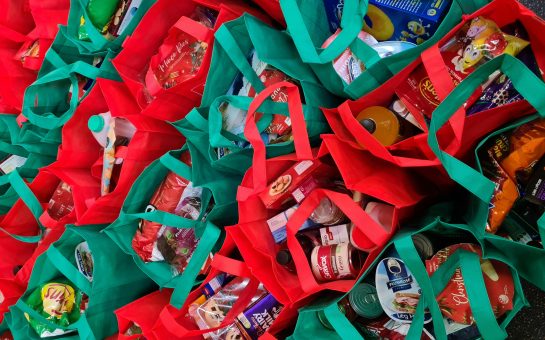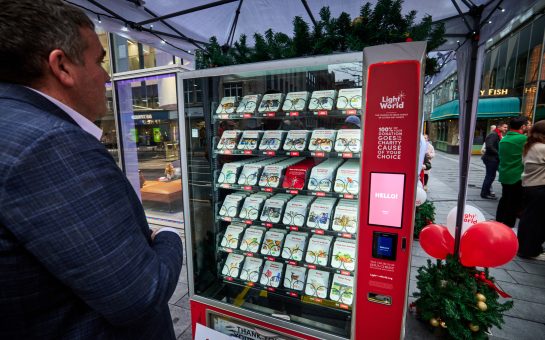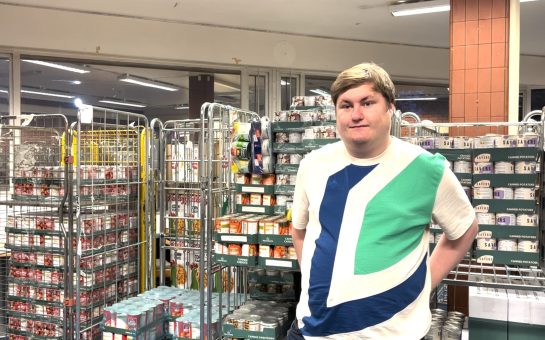Three times a week, different groups of Mancunian men, women and children alike make the journey to Manchester Universities’ Catholic Chaplaincy.
They might take a train to the nearby Oxford Road Station, or they might use one of Manchester’s famous yellow trams.
Some might take the bus, yet in reality, even if the journey is a long one, most probably have no choice but to walk. The reason that Mancunians make this journey is for the simplest of reasons: to pick up food.
The Chaplaincy is home to Manchester Central Food Bank, a Trussell Trust site founded by a group of university students in 2013.
The food bank provides emergency food packages to those in desperate need, and largely serves Ardwick, Longsight, City Centre residents, and some parts of East Manchester.
Amy Wisenfeld works at the food bank – she joined part-time whilst studying for a Masters, yet joined full-time as the Project Manager eight months ago.
She says that of the three years she has worked at Trussell Trust, the last year at Manchester Central has been busier than any other she has seen.
“We’ve definitely seen an increase in the number of people who are using our foodbanks.
The #Souperheroes have arrived! We are delighted to announce that we’re teaming up with @MMU_Food to deliver our Soup-erheroes #campaign serving #healthy and #delicious soups starting on Wednesday 16th January! Our #heroes will use their #nutritional powers for good #health! pic.twitter.com/aMkFAQEpqY
— MetMUnch (@MetMUnch) January 7, 2019
“So far this year we have redeemed over a thousand vouchers, which have fed over two thousand individuals. That’s an increase in pure statistics on the previous year.
“It’s not a huge increase but it is definitely an increase in the amount of people that we have fed.”
‘THE SYSTEM IS REALLY JUST THERE TO PUNISH THEM’
The Trussell Trust across the whole of the UK has seen an increase in general use of around 13%, and there are reports that the number of privately-run food banks could even outstrip the number run by the Trust.
Prime Minister Theresa May declared in October that austerity was ‘over’, pointing to the end of a comprehensive squeeze on public spending implemented by former Chancellor George Osborne.
The current Chancellor Philip Hammond echoed May’s comments that the age of austerity was behind Great Britain, yet the topic of poverty refuses to go away.
The pressure on the Tory Party was ramped up when UN representative Philip Alston offered a staggeringly strongly worded swipe at the parties’ policy following a recent visit to the UK to examine poverty levels.
Alston visited a food bank in Newcastle, also visiting Scotland, Northern Ireland and London as part of his trip. He said that Ministers were in a ‘state of denial’ about poverty, saying that the ‘misery’ he saw on his tour was caused a by a purposeful government policy, as opposed to a necessity.
Speaking about his experience, Alston said: “A lot of misery, a lot of people who feel the system is failing them; a lot of people who feel the system is really just there to punish them.”
Alston used very emotive language when describing his experience, yet his findings reflected reality for Amy and those who use Manchester Central Food Bank.
“Even if ten people access the food bank in a year you could say that is not acceptable, no one should be accessing them.
What are the problems with #UniversalCredit? Great video from @BBCNews @BBCMBuchanan talking clearly through the issues many people at #foodbanks are facing. This isn’t inevitable. Our benefits system can & must offer proper support to us when we need it > https://t.co/KmC7u1JrS7
— The Trussell Trust (@TrussellTrust) December 20, 2018
“It’s great that the support is there, but we want to live in a society where there is already enough support there. In that sense I totally agree with the outlook of the UN Report.”
A key topic raised by Alston was the controversial roll-out of Universal Credit, a new monthly benefit payment designed to replace six of the benefits paid more regularly, such as Income Support and Job Seeker’s Allowance.
Universal Credit has only been introduced in some areas of the country so far, yet reported delays in the enrolment process have been cited as a key factor in the increased usage of food banks.
Many people have had to wait up to six weeks for their first payment, leaving some of the poorest in society with the task of paying their bills and buying food for a month and a half with no income.
There have been many reports of people being forced into high-interest loans and credit cards to pay for their essentials, beginning a cycle of debt that can be hard to recover from.
Amy says that a large proportion of the people she deals with on a day-to-day basis are forced into using the food banks because of Universal Credit delays.
“The first issue with Universal Credit is the waiting period, which has been in the news a lot,” she said.
“It can be a five-week waiting period when you change from one benefit to another, which is leaving people in the lurch a lot in that period.
“We’ve seen general issues with the monthly payments as it obviously used to be twice a month.”
4.6 MILLION IN UK LIVE IN ‘PERSISTENT POVERTY’
Overall, there is an unfortunate weight of evidence that poverty in the UK is rife. A study from Eurostat earlier this year revealed that nine out of the ten poorest regions in Northern Europe are in the United Kingdom.
Another report by the Joseph Rowntree Foundation found that 22% of people in the UK are living in poverty, more than one in five people. 7% of those people are living in ‘persistent poverty’, some 4.6 million people overall.
The economic strain in the UK is sadly disproportionally affecting children, with 4.1 million children now living in poverty in this country, and the situation in Manchester is reflective of the wider problem.
The JRF report shows that 32% of children in the North-West are living in poverty, higher than the national average of 30%.
Amy reveals to me that of the 2,000 people to receive emergency food packages from her food bank this year, 700 were children.
For families struggling to get by Christmas can be the most difficult time of the year. No parent wants their child to spend Christmas hungry, or to wake up on Christmas morning with no presents under the tree, and Amy and the staff at the food bank are empathetic to the strain those with children can experience.
“It makes their whole situation much more visible I think during the Christmas period,” she says.
Trussell Trust statistics show that December was by far the busiest month for food banks in 2017, and 65,000+ children received food supplies in the month.
The numbers have been rising year on year since 2012, and a recent statement from Trussell Trust’s chief executive Emma Revie highlighted the issues people faced last year in the run-up to Christmas.
She said: “Christmas is supposed to be a time for joy but what we’re seeing is the festive period becoming increasingly stressful for more and more people across the country.
“Our benefits system is supposed protect us all from being swept into poverty – but what we’re seeing is people struggling to heat homes and put food on the table because they simply cannot afford the basics anymore and that just isn’t right.”
Great to have Amy Wisenfeld from @McrFoodbank join us for our last Assmebly on Homelessness and Poverty with students from @Levenshulmehigh. It’s been a great week and students are now focused on Action and doing their bit to get the message out and help end rough sleeping in GM pic.twitter.com/8ICPwa5NZS
— Manchester Citizens (@GMCitizens) December 13, 2018
Manchester has firmly established itself as ‘Capital of the North’ and it is a common site to see cranes marking further exciting developments in the City Centre, yet it is surely worrisome for any Mancunian that while the city thrives, the numbers of its people struggling to buy the very essentials is rising each year.
Manchester Central accepted food donations in the run-up to last Christmas, and Amy says that there are certain areas that are in short supply.
“We could do with anything non-perishable really – we run low on tinned meat, tinned puddings, tinned fruit, powdered milk etc.”
Donation link – https://manchestercentral.foodbank.org.uk/give-help/donate-food/



